Or: Zimbabwe, Western arrogance, ignorance, and dump propaganda.
Western media is jubilating. The Washington Post, owned by Jeff Bezos, with 100 billion US$ the worlds richest man, writes:
“For 37 years, it was the official newspaper of Robert Mugabe. Then, this month, the staff of the Zimbabwe Herald got an impossible assignment: They would have to cover the downfall of their benefactor.”
And: “Suddenly, a newsroom that had been the mouthpiece of the regime was without a censor.”
The Zimbabwe Herald, supposedly freed of dictatorial censorship, writes:
“The resignation marked the end of an era for an African political icon. Admired by many in Africa as a liberation icon, Mugabe offered a message of hope and unity to millions of his compatriots when he became the first black prime minister of newly independent Zimbabwe on April 18 1980.
He did not disappoint on his promise during the greater part of his 37 years in power, delivering a free education system that was the envy of many of Zimbabwe’s neighbors and far afield, as well as announcing a much vaunted policy of reconciliation with the white population of the country soon after independence.”
And:
“Under his rule, Zimbabwe remained one of the countries with high literacy rates in Sub-Saharan Africa, averaging above 90 percent of the population over the greater part of the past 30 years.
Since independence in 1980, the Zimbabwean government has always prioritized education by giving it one of the highest allocations in its national budgets. Figures from the Zimbabwe National Statistical Agency show that the literacy rate has consistently risen over the past 25 years despite economic challenges faced by the country, rising from 80.38 percent in 1992 to 97,6 percent in 2014.
Mugabe is also credited with the program to give land to landless Zimbabweans that was pursued by the government since 2000. Over 300,000 families benefited from the land reform program, an exercise Mugabe said was meant to address the historical inequalities in the ownership of natural resources.
Under the economic indigenization program, introduced in 2010, Mugabe made sure that indigenous Zimbabweans benefited from the exploitation of natural resources of the country. Widely resisted by some foreign investors but greeted with enthusiasm from locals, the program required foreigners to surrender at least 49 percent of their shareholding to Zimbabweans.”
This is still not what Western commentators would like to hear and the Washington Post consequently headlined an article: “Zimbabwe’s New Leader Stirs Fears That He Resembles the Old One.”
Robert Mugabe was in the concluding months of his presidency, with elections scheduled in mid-2018.
He had joined the national liberation movement in his country at a young age while working as an educator and youth leader in that former settler colonial outpost that the British called Rhodesia. During the late 1950s and early 1960s, he lived, worked, and studied in the West African state of Ghana, which was then the fountainhead of Pan-Africanism under Dr. Kwame Nkrumah.
After being imprisoned by the British for a decade in the 1960s and early 1970s, Mugabe relocated to Tanzania and Mozambique to work full time as a leader of ZANU. He led the negotiations for the Lancaster House agreement which paved the way towards nonracial, democratic elections in Southern Rhodesia in 1980, resulting in his installment as prime minister. By 1985, Zimbabwe had become a republic with ZANU-PF as the leading political party.
A land redistribution program enacted in 2000 was met with stringent Western sanctions and a merciless economic war against Zimbabwe. Mugabe was not deterred, and the program, popularly referred to as “the Third Chimurenga,” has been a cornerstone of domestic policy since then.
In 2009, Mugabe signed the IEEA (Indigenization and Economic Empowerment Act ) into law, aiming to place 51 percent of companies into the hands of black Zimbabweans. This indigenization policy is a blue print for the post-colonial states in Africa, who all suffer from a dominance of foreign capital over the national and regional economies.
Cut off from Western trade, Zimbabwe relied on South Africa, the SADC (Southern African Development Community), the AU (African Union), Mozambique, China, Russia, Cuba, and other states who were not afraid of US/NATO scorn.
Mugabe served as chair of the AU in 2015, advancing the cause of economic integration and independence from Western states. This year, he presented a one million US$ fundraising check to the AU, setting an example for individual state commitment to the continental body.
Recent divisions within ZANU-PF came to a head after Vice President Emmerson Mnangagwa, nicknamed “the crocodile,” in early November was relieved of his duties. He represented the old guard, called Lacoste group, and was at odds with the Generation 40 group, led by Jonathan Moyo and Saviour Kasukuwere.
At least 100 other party officials were being examined for possible expulsion from both party and government, but the Lacoste group was not defenseless. Mnangagwa, who had close ties to military brass, plotted his comeback.
ZDF (Zimbabwe Defense Forces) head General Constantino Chiwenga held a press conference along with 90 other military officers at which he threatened intervention if the purges did not cease.
Immediately after the press conference tanks moved into Zimbabwe’s capital Harare and the ZDF seized the main television station. Maj. Gen. S.B. Moyo went on television saying that there had not been a military coup and the military was only targeting “criminals” surrounding the president.
The government before had attempted to snuff out the coup plotters and had dispatched a police paramilitary unit to arrest General Chiwenga upon his return from China. However, military intelligence caught wind of the plan and when Chiwenga’s plane arrived, a team of soldiers dressed in National Handling Services uniforms got inside the airport and chased the policemen away. The army then immediately attacked the police at the parliament building and seized the police paramilitary camp and armory.
The first casualty of the long planned coup was Mugabe’s head of security, Albert Ngulube. He was grabbed right at Mugabe’s gate and taken to a detention facility where he was brutally beaten. Secretary of Youth Affairs Kudzai Chipanga and his wife were forced to strip naked and sit on the floor at a police station. Kudzai Chipanga was severely beaten and forced to apologize on TV for criticising General Chiwenga. When an army unit attacked the home of finance minister Ignatius Chombo, it shot dead his three guards.
There were demonstrations in Harare, celebrating the coup, but they were not as massive as Western media portrayed them. The demonstrators were people with time at hand, unemployed for sure, but also rioters, hooligans, people who would take any chance to make a noise, to rampage, to let steam off.
In the absence of Robert Mugabe’s supporters, who had fled to neighboring countries or gone underground, ZANU-PF voted to expel the president and all known Generation 40 members from the party.
Mugabe was given the deadline November 20 to step down from office, which passed. The pressure on him was increased, with Senator Monica Mutsvangwa of Manicaland Province presenting an impeachment resolution to the parliament. After that Mugabe finally gave in and resigned.
Both the SADC and the AU expressed concerns over the coup in Zimbabwe, because under Mugabe the country had been an ideological and political base for Pan-Africanism and anti-imperialism on the continent. Alpha Conde, president of Guinea and African Union chief, said “it is a shame, Mugabe has to leave through the back door.” Conde called Mugabe an African hero. “Mugabe will never be forgotten, he was a great fighter.” There are reports that neighboring Zambian President Edgar Lungu was willing to militarily intervene in Zimbabwe and place his troops under Mugabe’s command.
Needless to say, that the Western press is delighted by the downfall of Mugabe.
The New York Times writes: “After nearly four decades in power, Zimbabwe’s ruler, Robert Mugabe, resigned in the wake of a military takeover. How did the notorious strongman manage to keep his opponents at bay for so long?”
The BBC writes: “So, will Emmerson Mnangagwa be able to take Zimbabwe’s economy off life support and at least start to put it on the road to recovery? Analysts are very skeptical that a quick solution is even feasible. The euphoria that has gripped the nation has certainly raised hopes that the future will be brighter, but if that improved sentiment is to deliver economic dividends, the government needs to make some drastic reforms.“
Britain, the former colonial power, was quick to advise the new government in Harare on how it should proceed:
Foreign Minister Boris Johnson called the resignation in a Twitter post “a moment of hope for the people of Zimbabwe.” This echoed the remarks of British Prime Minister Theresa May, who said that the sudden removal of Mugabe would “forge a new path free of the oppression that characterized his rule. In recent days we have seen the desire of the Zimbabwean people for free and fair elections and the opportunity to rebuild the country’s economy under a legitimate government.”
African countries in the second half of the 20th century tried to counterbalance political and economic pressure of the neocolonialist powers, wielded by trade wars, World Bank, IMF (International Monetary Fond), and bribes to the local “comprador class,” with increased ties to the USSR, but after the dissolution of the USSR they were again fully exposed to Western economic pressure and subversion.
Libya’s Muammar Gaddafi stepped in with his plans of a “Gold Dinar,” to replace the US Dollar, and an “African Development Bank.” China also stepped in, followed in distance by a resurgent Russia.
Of all African countries, Zimbabwe is the most logical target for Chinese and Russian investment. China and Russia vetoed all UN Security Council sanctions on Zimbabwe.
In 2015 and 2016, loan packages negotiated between China and Zimbabwe included 5 billion US$ for free aid and interest-free loans. China pledged to train 200,000 technical personnel and provide 40,000 training opportunities for African personnel in China. The aid intends to modernize agriculture with technological expertise, machinery, training, and teams of experts.
China is financing the expansion of the Hwange coal power plant and the Kariba South hydro power plant. China also pays the installation of fiber-optic cables for a high-speed Internet system and has built a pharmaceutical distribution center in Harare (Pharmaceuticals and Chemical Distributors Pvt Ltd.), in order to provide medicine to all hospitals and clinics at affordable prices. The country’s new parliament building in Harare was paid with Chinese money (46 million US$).
The Beijing Automotive Group produces with two local partners Grand Tiger pickup trucks assembled from kits. Chinese companies built a 150 million US$ expansion of Victoria Falls International Airport, upgraded Zimbabwe’s busiest highway, and supplied wildlife monitoring gear.
A Chinese company built the National Defense College in Harare, which opened in 2014 and was financed with an interest-free 98 million US$ loan. The college trains soldiers, intelligence operatives, and police from Zimbabwe and other Southern African countries.
Mugabe’s move to nationalize Zimbabwe’s diamond mines and revoke licenses from Chinese mining companies though caused tensions and maybe was a contributing factor to his downfall.
Russia’s biggest economic commitment to date is an agreement in 2014 to invest 3 billion US$ in Zimbabwe’s largest platinum mine. The project includes the installation of a refinery to add value, thereby creating more employment and secondary industries. The Darwendale operation near Harare is expected to produce 600,000 ounces of platinum a year when it reaches capacity.
China’s investments in Africa are a threat to Western dominance, especially because the investments focus on infrastructure and the development of indigenous industries, thereby making the countries less dependent on Western imports.
US Americans don’t offer infrastructure development to African nations, how could they, when they are not even able to keep their own infrastructure intact, with roads, bridges, dams, the electricity grid, water and sewage systems, Amtrak, the NYC Metro, and other vital installations in decay and urgently needing repair, updating, replacement.
Americans are not great in infrastructure, but what they can do easily is sending their special operation forces. US military involvement in Africa has grown substantially over the last decade, with troops in Somalia, Niger, Mali, Nigeria, Uganda, the building of a huge military base in Djibouti (Camp Lemonnier), and the formation of AFRICOM (US Africa Command). The Pentagon has confirmed that there are 6,000 US soldiers stationed throughout Africa.
China can’t yet make up for the former USSR’s power but it seems willing to protect its investments and partnerships with military force, for example by supplying weapons, equipment, and funds to the African Union’s military unit, or by deploying Chinese troops to South Sudan for protecting the oil pipelines, which have been sabotaged by US-supported rebel forces. China also has set up its first military base overseas in Djibouti, giving Chinese troops the opportunity to keep an eye on the main US AFRICOM base there.
To sum it up: China is a very welcome and highly needed counterweight to Western dominance and while some privately owned Chinese companies may exhibit chauvinism or even various forms of exploitation towards their African workers, usually Chinese engagements are not as damaging and adhere to higher moral standards then the ones of Western companies.
Will Zimbabwe continue on the path of economic independence or again become a colony of Western powers?
At the moment it can go either way. The factional struggle between the ZANU-PF old guard and the Generation 40 group has been decided by the army, which supported Emmerson Mnangagwa.
Mnangagwa received military training in China in 1963, soon after he joined the fight against white minority rule in then-Rhodesia. He and his friend General Chiwenga always kept close ties to Beijing.
Mnangagwa has wowed to fight corruption and has issued a three-month ultimatum for the return of funds siphoned out of the country by individuals and corporations. Since 2009 Zimbabwe is using the US dollar as its main currency, which has led to massive smuggling of dollars to offshore accounts. It is estimated that 2 billion US$ are illegally held in foreign bank accounts.
One has to wonder if the new president is the right man to fight corruption. Mnangagwa certainly has amassed a fortune himself during his political carrier and is rumored to be a millionaire or even billionaire.
It is also doubtful wether he is right man to keep Zimbabwe free from foreign influence. He let know that he has communication channels opened with IMF, World Bank, African Development Bank, European Union, and other international financiers that until now have shunned Zimbabwe.
In a 2015 interview with Chinese TV, Mnangagwa stated: “You cannot say there are areas of our economy which we are happy with… We have to see how we can create an investment environment which will attract the flow of capital. We must know that investment can only go where it makes a return so we must make sure we create an environment where investors are happy to put their money because there is a return.”
While Mnangagwa’s key ally and former finance minister Patrick Chinamasa declared during international negotiations that he had “fallen in love with the IMF and World Bank.”
Eddie Cross, economic secretary of Morgan Tsvangirai’s opposition party, praised Mnangagwa as “a business man who understands business.”
Cross deems it necessary to remove the Indigenization Act, give autonomy to the Reserve Bank, and pay compensation to the white farm owners who were expropriated during the land reform.
Western agencies are cautiously hopeful. IMF mission chief for Zimbabwe Gene Leon: “While growth in 2017 will be boosted by the bumper harvest due to the exceptional rainfall, the challenge is to sustain growth going forward in a context where macroeconomic stability is threatened by high government spending, the foreign exchange regime is untenable, and the pace of reform inadequate.”
Reform according to the IMF means: “… to rebalance the economy towards one where growth is driven by the private sector.” (Which is of course only possible by cuts to the public sector and by privatizations.)
Former Minister of Finance Tendai Biti chimed in: “We have to make peace with London, Brussels and Washington. We have to find the boys and girls with money.”
There is certainly a comprador class who is just waiting to facilitate an international looting operation and the vultures of the global financial system are on high alert, waiting for risk free investment opportunities, hiked up debt repayments, new usury loans, and privatizations at fire-sale prices.
They will have a hard time to compete with Chinese money and gain a foothold in Zimbabwe, they will most likely be blocked and outmaneuvered. Which is a reassuring prospect but doesn’t mean that everything will be fine.
Chinese investors may be not as wicket and vicious as their Western counterparts, after all, they have to stand up to their reputation of fairness and benevolence, but that is no guarantee they’ll act in the best interest of the targeted country.
Chinese tobacco company Tianze has given interest-free loans and training to farmers, many of whom work on land seized from white farmers, to help beef up production and help fill cigarette demand back home. This provides a livelihood for sure, but growing tobacco to make other people sick is not ecological, is a waste of resources.
When the Chinese government decides that something has to be done because cancer rates go through the roof, they will restrict smoking and African tobacco growers will have to learn something new. Maybe they will go back to subsistence farming, which would not be a bad move, as climate change in the coming years inevitably will cause droughts, crop failures, and severe famine. Food will become precious!
By the skewed benchmarks of mainstream economists, who measure only output and profit, ignoring ecological destruction and social injustice, large industrial farms are more productive than the small plots the Zimbabweans got in the land reform process.
Even that is debatable, as the Michael Lipton study has shown,
http://unctad.org/meetings/en/Presentation/SUC_GCF2013_18-03-2013_Michael-LIPTON_Study.pdf
(If the huge consumption of fuel for farm machines, synthetic fertilizers, and agrochemicals in industrial farming practices are taken into account, intensive subsistence farming is superior. It also causes less soul depletion and less chemical contaminate of soil, water, food.)
http://unctad.org/meetings/en/Presentation/SUC_GCF2013_18-03-2013_Michael-LIPTON_Study.pdf
(If the huge consumption of fuel for farm machines, synthetic fertilizers, and agrochemicals in industrial farming practices are taken into account, intensive subsistence farming is superior. It also causes less soul depletion and less chemical contaminate of soil, water, food.)
But this discussion is moot and the arguments are of no concern for the industrialists, the movers and shakers of our world. They exploit the lands riches at home and abroad, and if an area is exhausted, drained, used up, they move on to the next place.
They don’t have to worry. They will be fine on their remote islands and superyachts. Smartphones for the masses, pure, wholesome food and clean water for the rich elite.
Robert Mugabe knew that all, he was an intelligent and highly educated man. Does Emmerson Mnangagwa know it also? Or will he sell out the country for short term gains and his short term fame?
Related:
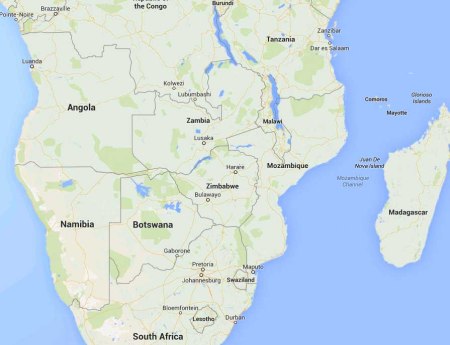
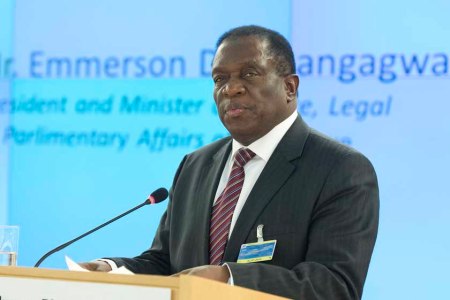
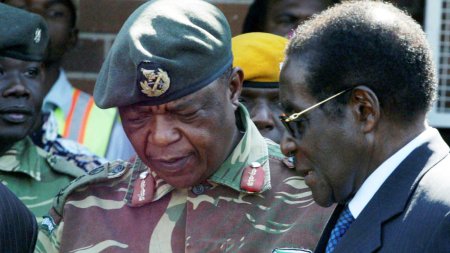
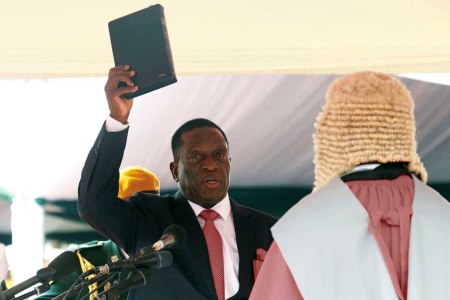
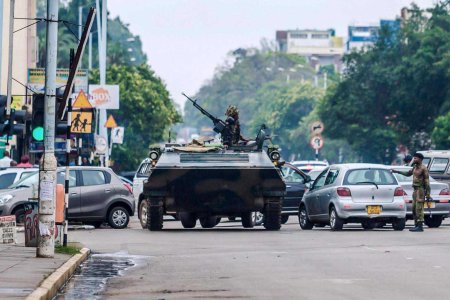
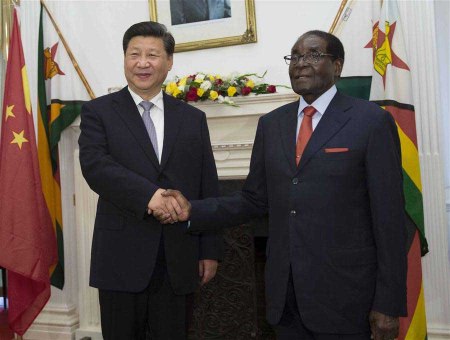
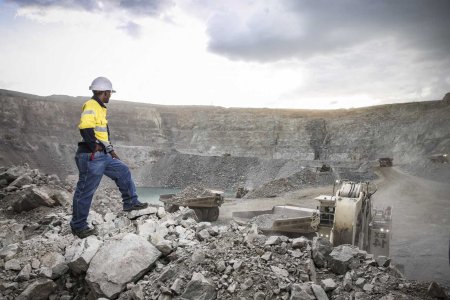
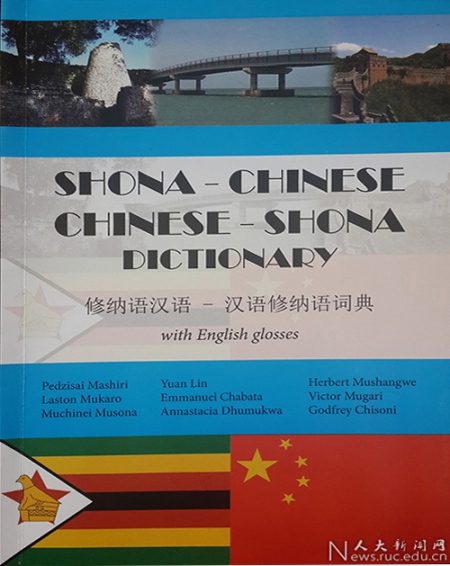
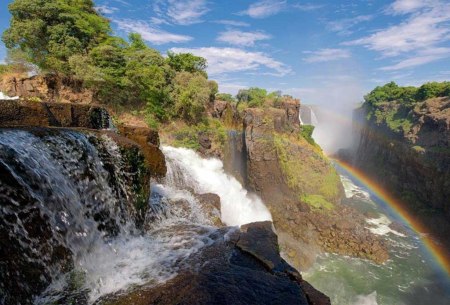
Keine Kommentare:
Kommentar veröffentlichen